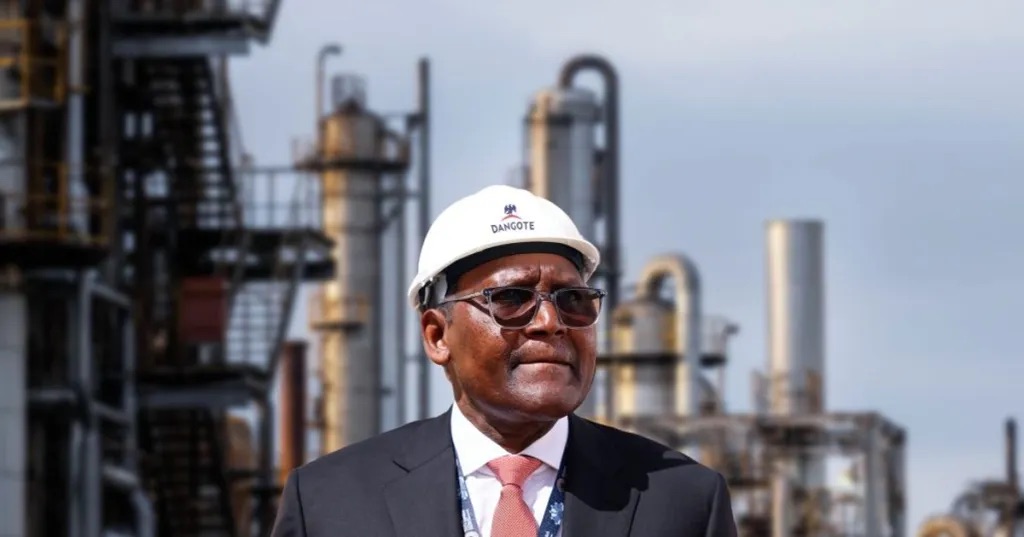Business
Dangote, fuel depots in fresh price battle for market control

A fresh battle for dominance is brewing in Nigeria’s fuel market as Dangote Refinery and private depot operators slash prices in a bid to capture a larger share of the downstream sector.
This comes as analysts warn that the country is not ready for the controversial 15 per cent import tariff on petrol the federal government plans to introduce.
At the weekend, the Dangote Refinery Dangote Refinery reduced its gantry price of Premium Motor Spirit (petrol), also known as petrol from N877 per litre, down to N828, representing a 5.6 per cent decrease.
Latest price data from Petroleumprice.ng showed that the price review took effect from Friday, marking the refinery’s second major adjustment in three months as it responds to market realities and efforts to stabilise domestic supply.
Some of the oil marketers confirmed Dangote’s price drop to Daily Sun in separate inquiries.
However, to ensure that their investments are protected and no one pushes them out of business, some depot owners have equally responded by dropping their gantry prices to attract patronage.
Petroleumprice.ng on Sunday morning revealed that Aiteo, Bovas and Eterna sold a litre of petrol at; N850, N848 and N870 respectively, while AIPEC, Ardova, Integrated and NIPCO pegged theirs at; N869, 870, N869 and N868 respectively.
However, despite the drop in the gantry price by Dangote Refinery and some depots, retail pump price of petrol has maintained its market average of N920 per litre, offering no respite of price cut to consumers.
A price market survey across Dangote retail partners which included; MRS, Ardova, Heyden, Sunbeth, TotalEnergies, Techno Oil, Hyde and Optima revealed that the market average has been pegged at 920 per litre.
The same scenario played out among major and independent market operators as prices have remained at N920 per litre.
Some marketers operating at the Apapa depot who pleaded anonymity told Daily Sun that the market is very volatile, warning that any marketer selling below the market average would be doing so at his or her own peril.
They complained that Dangote Refinery’s gantry price of N49 per litre has already pushed many fuel marketers into losses, noting that the slight price reductions they now offer are merely survival moves to stay in business.
Meanwhile, Nigeria has been warned against hastily implementing a 15 per cent tariff in imported petroleum products.
Research Director, Fuels and Refining, S&P Global Commodities Insights, Tanya Stepanova, stated this at a webinar organised by the Major Energies Marketers Association of Nigeria(MEMAN) at the weekend themed: “Fostering Competition and Innovation: Lessons from Deregulated Markets for Nigeria’s Energy Sector”.
Stepanova explained that reports indicate that Nigeria was still importing petroleum products to augment local production, especially what was being produced by the Dangote Refinery, an indication that the country was yet to be fully self-reliant in domestic production.
She disclosed that Nigeria’s gasoline imports could be higher than trade statistics imply, because some imports from Togo to Nigeria are likely flying under the radar. She hinted that traders bring supplies into offshore Lome and subsequently break the volumes, explaining that commodities at sea do not capture cargoes with a tonnage of under 5,000 dwt.
Also speaking, the Executive Secretary of MEMAN, Mr. Clement Isong, warned that the imposition of a 15 per cent tariff on imported petroleum product could be regressive and disproportionately impact low-income households and small businesses unless mitigated
Speaking on the topic: “Market Context and Local Refineries Protection,” Isong called for a transparent, evidence-based policy debate, urging that open market pricing computations and end-user prices be published regularly to prevent information asymmetry and market abuse.
According to the MEMAN ES, the proposed tariff would raise the landed cost of imported products, allowing local refiners to recover costs and margins, a key argument advanced by proponents who maintain that domestic production costs currently exceed import costs.
He added that importers would likely pass the tariffs on to consumers, while domestic refiners would price just below the new landed-cost floor, effectively removing the import benchmark that currently keeps prices competitive.
He further warned that such changes could create competitive distortions, squeezing smaller independent importers out of the market.
He stressed the need for active regulatory oversight by the Nigerian Midstream and Downstream Petroleum Regulatory Authority (NMDPRA) to ensure fair competition and nationwide product availability.
Instead of imposing the products import tariff, Isong outlined alternative and complementary policy measures, including phased or conditional implementation of tariffs tied to independently verified increases in domestic supply.
-

 News6 hours ago
News6 hours agoUmrah Suffers Setback As Airlines Suspend Flights To S/Arabia
-

 Politics7 hours ago
Politics7 hours agoAtiku’s son resigns from Fintiri’s cabinet
-

 News7 hours ago
News7 hours agoMajor, 3 Soldiers, Hunter Killed In Borno
-

 News21 hours ago
News21 hours agoJustice Tsoho To Appear Before CCB Over Alleged Non-Declaration Of Assets
-

 News7 hours ago
News7 hours agoRevised Executive Order: FG adjusts oil revenue remittance framework
-

 News7 hours ago
News7 hours agoPolice Council Confirms Disu As IG, To Be Sworn In Wednesday
-

 Politics6 hours ago
Politics6 hours agoDSS arrests social media user who ‘threatened’ Peter Obi after Edo attack
-

 Business6 hours ago
Business6 hours agoPrivate jet flight from Riyadh to Europe now cost N479m as elites flee Middle East tensions – Report


















